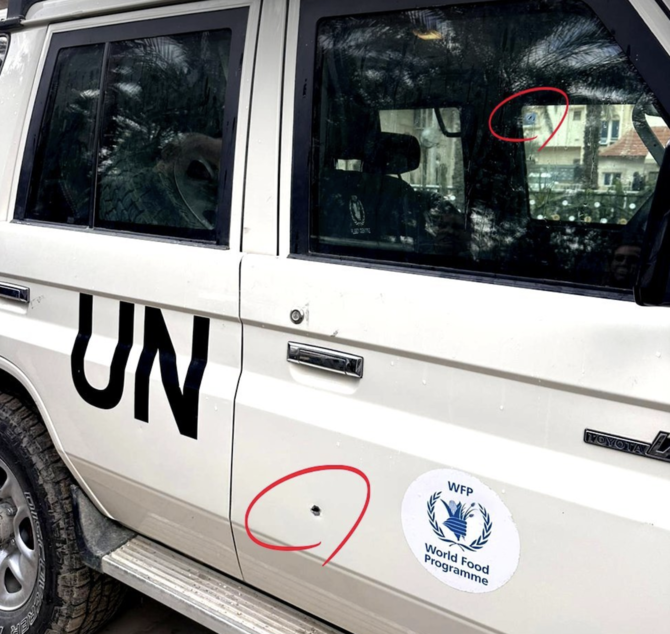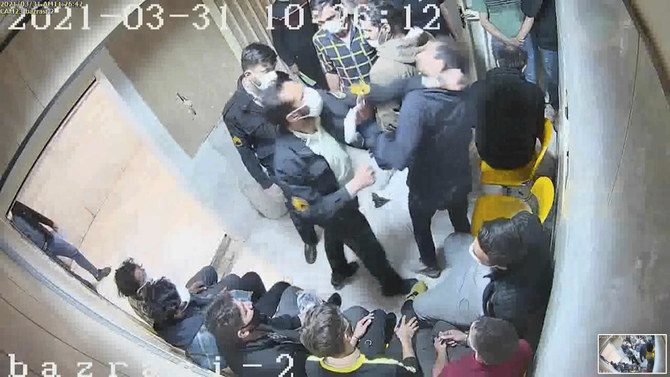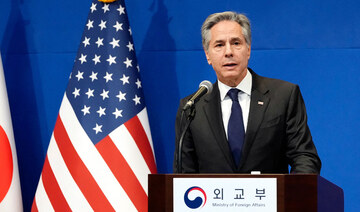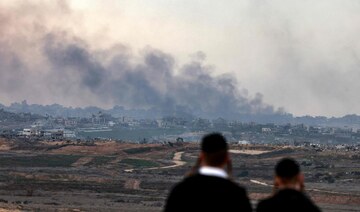DUBAI: The head of Iran’s prison system acknowledged Tuesday that videos purportedly obtained by a self-described hacker group that show abuses at the Islamic Republic’s notorious Evin prison are real, saying he took responsibility for the “unacceptable behaviors.”
The comment by Mohammad Mehdi Hajjmohammadi came the day after parts of the videos and a report were published about the abuse at the facility in northern Tehran, long known for holding political prisoners and those with ties to the West whom Iran uses as bargaining chips in international negotiations.
Writing on Twitter, Hajjmohammadi vowed to “avoid the repeat of such bitter incidents as well as confront the perpetrators.”
“My apologies to the Almighty God, the dear Supreme Leader, our great nation and the noble prison officers whose efforts will not be ignored because of the wrongdoings” of others, he wrote.
State television in Iran also reported Hajjmohammadi’s remarks.
Hajjmohammadi, however, offered no plan on how to address the abuses at Evin. Since its construction in 1971 under Iran’s shah, the prison has seen a series of abuses that continued into the Islamic Republic.
After Iran cracked down on protesters following the disputed 2009 re-election of hard-line President Mahmoud Ahmadinejad, many of the arrested protesters ended up in Evin. Lawmakers later pushed for reforms at Evin, following reports of abuses at the prison — which led to the installation of the closed-circuit cameras.
In one part of the footage, a man smashes a bathroom mirror to try to cut open his arm. Prisoners — and even guards — beat each other in scenes captured by surveillance cameras. Inmates sleeping in single rooms with bunk beds stacked three high against the walls, wrapping themselves in blankets to stay warm.
Four former prisoners at Evin, as well as an Iranian human rights activist abroad, said that the videos resemble areas from the facility in northern Tehran. Some of the scenes also matched photographs of the facility previously taken by journalists, as well as images of the prison as seen in satellite photos accessed by the AP.
An online account that shared the videos calls itself “The Justice of Ali,” a reference to the Prophet Muhammad’s son-in-law who is revered by Shiites. It also mocks Iran’s Supreme Leader Ali Khamenei. However, the account did not respond to AP questions about its membership or how it conducted the hack.
Iran official acknowledges videos of Evin prison abuse real
https://arab.news/b7p79
Iran official acknowledges videos of Evin prison abuse real

- Facility in northern Tehran long known for holding political prisoners
- Former prisoners at Evin said that the videos resemble areas from the prison
US temporarily eases some Syria sanctions

The US Treasury said it had issued a new general license to expand the allowed activities and transactions with Syria while Washington continues to monitor developments under the militants who overthrew Assad last month.
The move was made “to help ensure that sanctions do not impede essential services and continuity of governance functions across Syria, including the provision of electricity, energy, water, and sanitation,” the Treasury said in a statement.
Monday’s actions build on existing authorizations that support the work of international organizations, non-governmental organizations, and humanitarian and “stabilization efforts” in the region, it said.
“The end of Bashar Assad’s brutal and repressive rule, backed by Russia and Iran, provides a unique opportunity for Syria and its people to rebuild,” said deputy Treasury secretary Wally Adeyemo.
“During this period of transition, Treasury will continue to support humanitarian assistance and responsible governance in Syria,” he added.
The transitional government in Damascus has been lobbying to have sanctions lifted.
But the international community has been hesitant to roll back restrictions, and many countries — including the United States — have said they are waiting to see how the new authorities exercise their power before doing so.
The Treasury Department emphasized that it had not unblocked any property or other interests of people or entities currently on its sanctions blacklist.
This includes Assad and his supporters, the Syrian central bank and Hayat Tahrir Al-Sham, a former Al-Qaeda offshoot that played a key role in toppling the former government.
It also does not authorize “any financial transfers to any blocked person other than for the purpose of effecting certain authorized payments to governing institutions or associated service providers in Syria,” the Treasury said.
Over 45,850 Palestinians killed in Gaza offensive

- Israeli forces kept up their bombardment of Gaza on Monday, with the territory’s civil defense agency reporting 13 people killed in strikes in the territory
GAZA CITY: The Health Ministry in Gaza said on Monday that 49 people were killed in the Palestinian territory in the past 24 hours, taking the overall death toll of the war to 45,854.
The ministry also said in a statement that at least 109,139 people had been wounded in nearly 15 months of war between Israel and Hamas, triggered by the Palestinian group’s October 7, 2023 attack.
Also on Monday, the UN World Food Programme said that Israeli forces opened fire on its convoy in Gaza on Jan. 5 in an incident it described as “horrifying.”
The agency said that its convoy of three vehicles carrying eight staff members was struck by 16 bullets near the Wadi Gaza checkpoint, causing no injuries.
The WFP statement said the convoy was clearly marked and had received prior security clearances from Israeli authorities.
Israeli forces kept up their bombardment of Gaza on Monday, with the territory’s civil defense agency reporting 13 people killed in strikes in the territory.
Mediators from Qatar, Egypt, and the US have been working for months to strike a deal to end the fighting in Gaza, but both warring sides have accused the other of derailing the negotiations.
Israel said on Monday that Hamas had yet to clarify whether 34 hostages it claimed it was ready to free were dead or alive, throwing doubt on the group’s assertion that it needed time to ascertain their fate.
The offer from Hamas came as Israel continued to pound the Gaza Strip, where rescuers said 13 people were killed on Monday.
In recent days, mediators have resumed indirect talks, and a senior Hamas official said late on Sunday that the group was prepared to release an initial batch of captives but would need “a week of calm” to determine whether they were still alive.
Israeli government spokesman David Mencer, however, rejected that claim on Monday.
“They know precisely who is alive and who is dead. They know precisely where the hostages are,” Mencer told journalists in an online briefing. “Gaza is a very small place. Hamas know exactly where they are.”
In an earlier statement, Prime Minister Benjamin Netanyahu’s office said Israel had not received any confirmation or comment from Hamas regarding the “status of the hostages,” adding those slated for inclusion were part of a list “originally given by Israel to the mediators” last year. The Hamas official had also said the group came from a list presented by Israel and would include all the women, children, elderly, and sick captives still held in Gaza.
“Hamas has agreed to release the 34 prisoners, whether alive or dead,” the official said, but the group needed time “to communicate with the captors and identify those who are alive and those who are dead.”
On Monday, US Secretary of State Antony Blinken voiced confidence that a ceasefire deal would come together, but possibly after President Joe Biden leaves office on Jan.20.
“If we don’t get it across the finish line in the next two weeks, I’m confident that it will get its completion at some point, hopefully, sooner rather than later,” Blinken said on a visit to Seoul.
President-elect Donald Trump, who takes over on Jan. 20, has vowed even stronger support for Israel and has warned Hamas of “hell to pay” if it does not free the hostages.
Israel’s left-leaning Haaretz newspaper reported Monday that negotiations with Hamas “are approaching a crossroads, and Israeli decision-makers are optimistic that a deal can be finalized within the next few days.”
Some Israeli news websites reported that the chief of Israel’s spy agency, Mossad, was joining the country’s negotiators in Doha.
Lebanese army redeploys in Naqoura as Israeli ceasefire violations continue

- Truce monitoring committee meets with participation of US envoy Hochstein
BEIRUT: Lebanese army convoys entered the coastal city of Naqoura on Monday to be redeployed and repositioned following the withdrawal of Israeli forces that had invaded the area during last year’s war.
The redeployment came as the quintet committee tasked with implementing the ceasefire agreement held a meeting in Ras Al-Naqoura, which US envoy Amos Hochstein attended for the first time.
Lebanese army vehicles have gathered in the south of Tyre in preparation for their entry to Naqoura after the army’s bulldozers carried out sweeping operations in the area for the past two days following the Israeli army’s withdrawal.

A security source said that the army was expected to reposition itself in the sites it had evacuated before the Israeli invasion last year.
A US military representative, a French military representative and military members representing Lebanon, Israel and UNIFIL were present at the quintet committee’s meeting.
The committee met amid increasing Lebanese and UNIFIL complaints about Israeli violations of the ceasefire agreement.
FASTFACT
US envoy Amos Hochstein held talks with Lebanese Army Commander Gen. Joseph Aoun before the quintet committee’s session, followed by meetings with Parliament Speaker Nabih Berri and Prime Minister Najib Mikati.
A significant Israeli violation took place last Saturday.
UNIFIL said in a statement: “The peacekeepers observed an Israeli army bulldozer destroying a blue barrel marking the line of withdrawal between Lebanon and Israel in Labbouneh, as well as an observation tower belonging to the Lebanese armed forces immediately beside a UNIFIL position.”
The peacekeeping force described the move as “deliberate and direct destruction of both clearly identifiable UNIFIL property and infrastructure belonging to the Lebanese armed forces, which is a flagrant violation of Resolution 1701 and international law.”
Earlier, Israeli bulldozers uprooted a Lebanese army observation tower 10 meters from where the quintet committee’s meeting would later take place at UNIFIL headquarters.
Hochstein, who helped draft the ceasefire agreement between the Israeli army and Hezbollah, arrived on Tuesday morning at Beirut’s Rafic Hariri International Airport.
He held talks with Lebanese Army Commander Gen. Joseph Aoun before the quintet committee’s session, followed by meetings with Parliament Speaker Nabih Berri and Caretaker Prime Minister Najib Mikati.
Meanwhile, a patrol from UNIFIL removed the earthen barrier that Israeli forces had set up on Sunday at the southern entrance of the town of Burj Al-Muluk.
In the morning, Israeli forces demolished several houses in Naqoura before the scheduled deployment of the Lebanese army.
UNIFIL forces activated their alarm sirens in two phases, at level three and level two, from their headquarters in Naqoura.
The Israeli army demolished several houses in the town of Al-Jabin, located in the Tyre district.
The home of Lebanese Army Brig. Gen. Abbas Hassan Aqil was destroyed in the operation.
Israeli violations during the past 48 hours included combing operations in the towns of Maroun Al-Ras and Aitaroun in the Bint Jbeil district, using heavy machine guns, and blowing up houses in Aitaroun.
An Israeli force penetrated Taybeh, carried out a combing operation, and blew up several houses inside the town.
Lebanese Army Command said: “In light of the violations by Israel of the ceasefire agreement and its assaults on Lebanon’s sovereignty and its citizens, hostile forces infiltrated the area of Taybeh–Marjeyoun on Sunday.
“They proceeded to block three roads with earthen barriers.
“Subsequently, a patrol from the army was dispatched to the incursion site to monitor the situation in coordination with the five-member committee overseeing the ceasefire agreement, and the roads were reopened.
Israel also fired shells at homes in Bint Jbeil, Wadi Al-Hujayr, Markaba, Mays Al-Jabal and Burj Al-Muluk.
On Monday, civil defense personnel recovered the bodies of seven Hezbollah fighters who had died in previous confrontations with Israel in the town of Khiam.
Some bodies in southern border villages have yet to be retrieved due to the Israeli incursion, despite 41 days passing since the ceasefire was reached.
Meanwhile, statements by Hezbollah officials asserting that the party has not been defeated provoked local reactions.
Hezbollah’s Liaison and Coordination Unit official Wafiq Safa said from Beirut that the party “has not been defeated and will not be defeated. It is stronger than iron, and there will be no possibility for anyone to break our morale.”
Hezbollah’s Secretary-General Sheikh Naim Qassem said: “Our patience with Israel's violations is linked to the appropriate time to confront the enemy.
“It can run out before or after the 60-day deadline. When we decide to do something, you will directly see it.”
The statements sparked a series of responses.
Former President Michel Sleiman said: “This is a Hezbollah official imposing a security veto against the state carrying out its responsibilities.
“May God have mercy on those who lost their lives, houses and livelihoods due to unilateral war decisions. A futile support war that had catastrophic consequences.”
The Tajadod (Renewal) parliamentary bloc said: “The positions expressed by Wafiq Safa confirm that Hezbollah is trying to cover up its losses, surrender, suicidal choices and continued disruption of the constitution and institutions.
“It would have been better for Hezbollah, following the disastrous war it caused, to learn and return to its Lebanese identity just like any other component in the country. However, it insists on its behavior that contradicts the meaning of Lebanon as a diverse and open country and the concept of the state and its institutions. Enough is enough. The era of terrorizing the Lebanese people is over.”
MP Sethrida Geagea addressed Safa, saying: “Wafik Safa, look at yourself. Feel your hands. You know very well what you have committed against your people and the Lebanese. A final phrase to summarize your situation: People with any sense of shame are a thing of the past.”
MP Michel Daher said: “Should not Wafik Safa ask about who will take in the displaced again if war is renewed, God forbid? We are tired of this rhetoric and approach. We want a proper country.”
World Food Programme condemns Israeli attack on its Gaza convoy

- WFP said convoy of three vehicles carrying eight staff members from central Gaza to Gaza City in the north was struck by 16 bullets near the Wadi Gaza checkpoint
GENEVA: The UN World Food Programme said on Monday that Israeli forces had opened fire on one of its convoys in the besieged Palestinian enclave of Gaza in what it called a “horrifying incident.”
The agency said the convoy of three vehicles carrying eight staff members from central Gaza to Gaza City in the north was struck by 16 bullets near the Wadi Gaza checkpoint on Sunday, causing no injuries but immobilizing the convoy.
The vehicles were clearly marked and had received prior security clearances from Israeli authorities, a WFP statement said.
“The World Food Programme (WFP) strongly condemns the horrifying incident on January 5,” it said.
“This unacceptable event is just the latest example of the complex and dangerous working environment that WFP and other agencies are operating in today,” WFP said, calling for improvements in security conditions to allow aid to continue.
The Israeli military did not immediately respond to a request for comment on the incident.
International aid agencies working to alleviate the humanitarian crisis in Gaza have frequently accused Israeli forces of hampering or threatening their operations amid Israel’s campaign to wipe out Hamas militants.
Israeli forces kill teenager in West Bank raid

- Medics reported that Madani had been shot in the chest and that Israeli forces initially kept him with them before handing him to Palestinian medics
NABLUS: The Palestinian Health Ministry in the Israeli-occupied West Bank stated that Israeli forces had killed a teenager during a raid on a refugee camp near the city of Nablus on Sunday.
Mutaz Ahmad Abdul Wahab Madani, 17, was “killed, and occupation forces’ gunfire wounded two others during a raid near Askar Camp east of Nablus,” the Ramallah-based ministry said in a statement.
Palestinian news agency Wafa reported that Madani was hit when Israeli forces fired bullets, flares, and tear gas.
Medics reported that Madani had been shot in the chest and that Israeli forces initially kept him with them before handing him to Palestinian medics.
He was then transported to Rafidia Hospital in critical condition but succumbed to his wounds, a medic said. Violence in the West Bank has intensified since war broke out in the Gaza Strip after the Oct. 7, 2023, attack on Israel.
Since then, at least 818 Palestinians have been killed in the territory by Israeli troops or settlers, according to the Health Ministry.
Meanwhile, the Israeli military and emergency services said gunmen opened fire on Monday on a bus and other vehicles near a village in the West Bank, killing three people and wounding seven.
“Paramedics have confirmed the deaths of three victims, including two women and a man,” emergency service provider Magen David Adom said.
The military said that all three of the dead held Israeli citizenship.



















